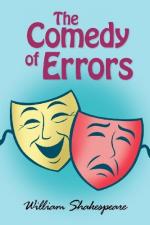|
This section contains 5,732 words (approx. 15 pages at 400 words per page) |

|
Russ McDonald and Jack A. Vaughn argue that we should take the play for what it is- a farce. McDonald in particular notes that "farce" and "Shakespeare" need not be mutually exclusive terms. Vaughn argues that although the play should be classified as a farce, it is not a "simple" one because Aegeon's framing story gives the play depth. J. Dennis Huston and Robert Ornstein stop short of classifying the playas an outand-out farce. Huston refers to the playas "nearly unmitigated farce," tempering his classification by noting the elements of tragedy (Aegeon's story) and romance (Aegeon's separation from Aemilia and his other son). Ornstein argues that Shakespeare adheres almost exclusively to Plautus's play even though he begins The Comedy of Errors with Aegeon's tragic tale.
Stephen Greenblatt, Ralph Berry, Maurice Charney, and David Bevington all propose taking an evaluation of the play's genre beyond farce. Greenblatt, Charney...
|
This section contains 5,732 words (approx. 15 pages at 400 words per page) |

|




